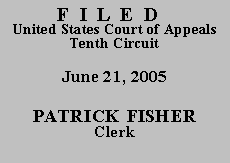

| MICHAEL JEROME BROWN, | No. 04-5151
(D.C. No. 04-CV-364-C) |
Mr. Brown was convicted of knowingly possessing a firearm in violation of 18 U.S.C. § 922(g)(1). The district court sentenced Mr. Brown to 120 months in prison followed by three years of supervised release. We affirmed his conviction on direct appeal. United States v. Brown, 314 F.3d 1216 (10th Cir.), cert. denied, 537 U.S. 1223 (2003). In support of his § 2255 application to the district court, Mr. Brown asserted ineffective assistance of trial counsel. The court denied his petition. In his application for a COA and opening brief submitted to us, Mr. Brown makes no mention of the district court's dismissal of his petition for habeas relief on the grounds of ineffective assistance of counsel. We therefore deem the issue waived. See Hendrick v. Rockwell, 24 F.3d 1272, 1277-78 (10th Cir. 1994) (holding issues not raised in opening brief are deemed waived).
The substance of Mr. Brown's application to us is really a request for authorization to file a successive petition on the grounds that his sentence is unconstitutional under the recent Supreme Court decisions of Blakely v. Washington, 124 S. Ct. 2531 (2004), and United States v. Booker, 125 S. Ct. 738 (2005). But we can certify Mr. Brown's successive § 2255 petition only if he can identify "a new rule of constitutional law, made retroactive to cases on collateral review by the Supreme Court, that was previously unavailable." 28 U.S.C. § 2255. We have determined that "a new rule is made retroactive to cases on collateral review only when the Supreme Court explicitly holds that the rule it announced applies retroactively to such cases." Bey v. United States, 399 F.3d 1266, 1268 (10th Cir. 2005). In Leonard v. United States, 383 F.3d 1146 (10th Cir. 2004), we held that Blakely is not retroactive, thus authorization for a successive petition under § 2255 was not proper. Id. at 1148. We have also held that Booker does not apply retroactively because Booker involved a direct appeal and there is no language in the opinion explicitly addressing retroactivity. Bey, 399 F.3d at 1269. In light of the above, Mr. Brown's request for authorization to file a successive petition is denied. This order is not subject to a petition for rehearing or a writ of certiorari. See 28 U.S.C. § 2244(b)(3)(E).
We DENY Mr. Brown's request for a COA. We also DENY Mr. Brown's request to file a successive § 2255 petition, and his motion to proceed ifp.
SUBMITTED FOR THE COURT
Stephanie K. Seymour
Circuit Judge
*.Allegations in a pro se complaint are construed liberally. Hunt v. Uphoff, 199 F.3d 1220, 1223 (10th Cir. 1999) (quotation omitted).